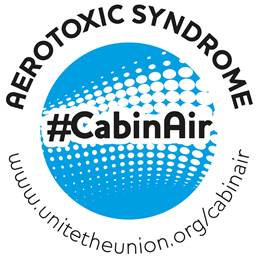The summer holiday season is now well and truly over. 200 million passengers will have gone through UK airports this year. Most people are only on an aeroplane once or twice a year. However, cabin crew often fly numerous trips per day. Each one of them will suffer a “fume event” during their career. A fume event is exposure to toxic fumes from the aircraft engine. These occur in 1 flight in 100.
 In order to achieve sufficient air pressure to breath a supply of warm compressed air is required. In most modern aircraft unfiltered air from jet engines is used to supply the cabin with air. It is mixed inside the aircraft with recirculated cabin air at a ratio of 50/50. In the event of an oil leak fumes can make their way directly inside the aircraft cabin via the aircraft ventilation system. The neurotoxins contained in these fumes can cause a number of illnesses and in some cases can be fatal.
In order to achieve sufficient air pressure to breath a supply of warm compressed air is required. In most modern aircraft unfiltered air from jet engines is used to supply the cabin with air. It is mixed inside the aircraft with recirculated cabin air at a ratio of 50/50. In the event of an oil leak fumes can make their way directly inside the aircraft cabin via the aircraft ventilation system. The neurotoxins contained in these fumes can cause a number of illnesses and in some cases can be fatal.
Symptoms include: Fatigue, Blurred or tunnel vision, Shaking and tremors, Loss of balance and vertigo, Seizures, Loss of consciousness, Memory impairment, Headaches,, Tinnitus, light-headedness, dizziness Confusion / cognitive problems, Feeling intoxicated, Nausea, Diarrhoea, Coughs, Breathing difficulties and respiratory failure. The syndrome is not diagnosed often and therefore can be mistreated.
A fume event is very difficult to detect but can often be detected by a visible haze or mist within the cabin or a strange smell.
Unite the Union is currently pursuing 17 cases over Aerotoxic Syndrome on behalf of cabin crew members. They are compiling a list of fume events. If you think you have been affected you should register here: http://www.unitetheunion.org/campaigning/cabin-air/
Airlines, as employers, are under a legal duty to ensure a safe place of work for their employees. This includes safe air. They must take measures to monitor air safety within the cabin for both employees and passengers. Both cabin crew and passengers may be entitled to compensation if they suffer injury as a result of a “fume event”.
The Warsaw and Montreal conventions provide that the carrier/airline is responsible for any injury suffered by a passenger if that injury happened on board an aircraft. The convention does have limited applicability depending on where you are travelling to and from. Domestic UK flights are covered under domestic legislation. However, there is a strict 2 year time limit to make a claim.
Aviation technology has advanced leaps and bounds over the last decade and has allowed us to fly across continents in less than a day. The next step, safe air on board, should be easy and there is no excuse for carriers to continue to allow this.


